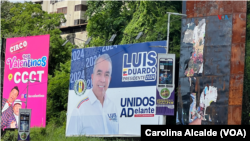The Venezuelan government said on Wednesday that it would be “difficult” to reestablish cooperation with the Office of the United Nations High Commissioner for Human Rights (OHCHR), Volker Türk, whose report on the situation in the country was rejected.
Türk presented his update on the state of human rights in Venezuela on Wednesday in an interactive dialogue at the UN Human Rights Council.
In the report, which covers the period from 1 May 2023 to 30 April this year, OHCHR highlighted various developments related to economic, social and cultural rights, restrictions on civic space and the rule of law, among others.
“As long as this aggressive attitude towards Venezuela persists, it will be very difficult to reestablish cooperation with your office, as was our wish,” said Alexander Yánez Deleuze, Venezuela’s permanent representative to the UN.
Yanez said that the government he represents does not recognize the UNHRC report because, he said, his mandate is the result of a resolution that sought to implement the policy of “regime change” in the South American country.
“It is a carefully worded propaganda pamphlet to encourage the fascist opposition in Venezuela,” he stressed.
In April, the Venezuelan government committed to International Criminal Court (ICC) prosecutor Karim Khan to allow the return of the office of OHCHR.
The government of President Nicolás Maduro decided to suspend the activities of the OHCHR office in February of this year, after accusing it of not being an “impartial entity”, after stating that the detention of the lawyer expert in military affairs, Rocío San Miguel, could qualify, at that time, as a forced disappearancewhich was denied by the prosecution.
Electoral environment
Türk said on Wednesday that the presidential elections on July 28 and the regional elections scheduled for 2025 in Venezuela are a “key” opportunity to respect the will of the population and urged compliance with the agreements on electoral guarantees signed in Barbados.
The OHCHR also said its office continues to receive reports of arrests as the elections in which Maduro seeks a third term approach, which it said “does not fit well” and considered that these practices must be reversed.
In the report, he had previously confirmed his concern about political disqualifications that include “limiting opportunities to exercise the right to defense.”
Restrictions on civic space
He also expressed particular concern about intimidation and mistreatment of relatives and inmates, as well as the arrests of Rocío San Miguel and the journalist Carlos Julio Rojaswho he said have been detained without access to legal assistance of their choice.
“I call for all people arbitrarily detained in Venezuela to be released,” said Türk, referring specifically to activist Javier Tarazona, who this week completed three years in prison.
OHCHR has documented new “undue” restrictions on freedom of expression, including 10 new cases of radio station closures, adding to the 21 cases it had previously recorded.
He also said that at least 50 websites were blocked without notice of suspension by various public and private telecommunications operators.
“OHCHR recalls that any restriction on freedom of expression imposed by the State must comply with the conditions of legality, necessity, proportionality, and legitimate purpose,” the report stressed.
The document also highlighted that deficiencies in access to and supply of basic services such as water, electricity and fuel “continued to worsen” and acknowledged the impact of sectoral sanctions.
He also highlighted that the persistence of “economic challenges,” including high inflation and the devaluation of the Bolivar, the Venezuelan currency, factors that continued to restrict purchasing power, “disproportionately” affecting groups and communities in vulnerable situations.
OHCHR expressed concern about a draft law on non-governmental organisations and their funding, which according to various sectors restricts civic space. It also questioned the introduction of the draft law against fascism, neo-fascism and similar expressions.
“I reiterate my call to refrain from adopting such legislation, which would further restrict the right to freedom of association and expression,” he said.
Connect with the Voice of America! Subscribe to our channels Youtube, WhatsApp and the newsletter. Activate notifications and follow us on Facebook, X and Instagram.
















Add Comment